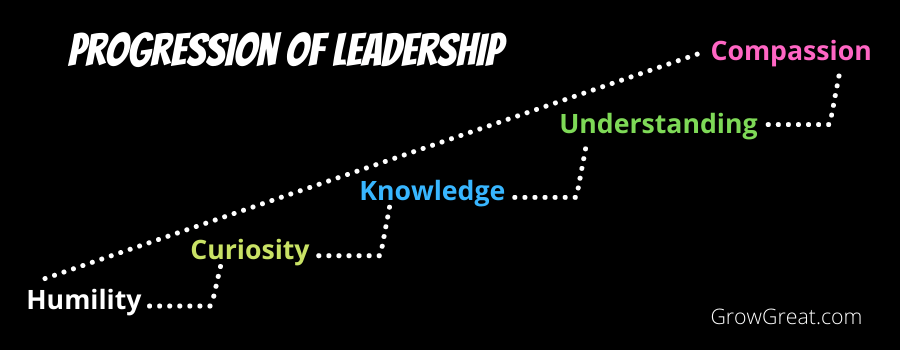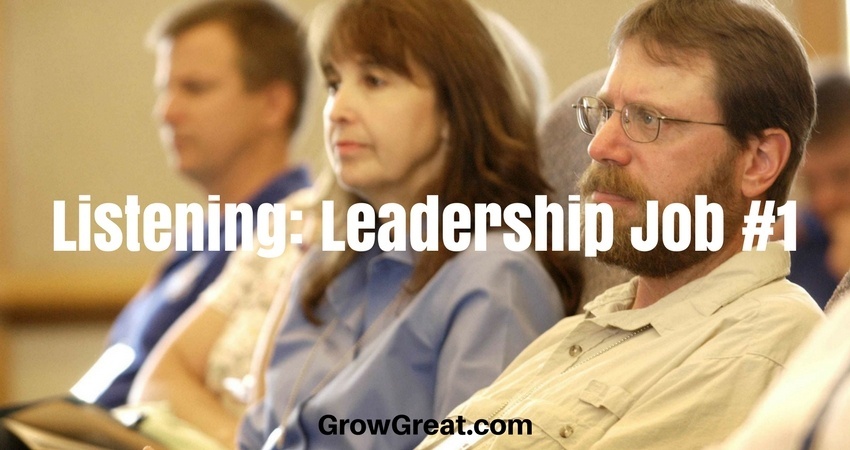30-Day Micro Leadership Course (September 2, 2021)
Podcast: Play in new window | Download (Duration: 8:45 — 8.0MB)
Subscribe: Apple Podcasts | Spotify | RSS | More
Let’s single out the component of the progression of leadership.

First, let’s discuss how it’s not just a progression, but it’s more of an ongoing recipe. If we think of these components as check-the-box things, we’ll miss the point. Like a recipe, sometimes we may need to lean more on one of them more heavily. People and situations will dictate our best use of each component.
The first ingredient is the most important. Think of it as the flour in any bread recipe. The other ingredients matter, but none matters more than the main ingredient. And for effective leaders, humility is the key ingredient.
Think of every leadership failure you’ve ever experienced. Think of every leadership failure you’ve witnessed. Odds are high that it was always a lack of humility.
Any time I let my pride get the best of me, things didn’t go well. I’ve always lost ground as a leader whenever I got too focused on myself and thought more highly of myself than I should. Every single time it resulted in a failure I regretted.
Humility is foundational for personal and professional growth because that’s what fuels our need and desire to improve. When we’re able and willing to face ourselves then we can better recognize what we can do better. And what we want to fix or improve.
Covering up. Hiding. Pretending. Putting up a front.
We all do it sometimes. Some of us do it a lot. And I’m not critiquing that because not every person or situation is safe enough for us to be truly honest. At least not openly.
But we’ve got to find a place where we can ditch all those acts and look more closely into the mirror.
The Magic Corner
Humility is required if we’re going to find our way into the corner where the magic happens. The corner? It’s that place we get to when we’re tired of making excuses. Once all the excuses are sucked out of our life, we can at long last work our way into the corner. It’s that metaphorical place where are backs are up against the wall and there’s nobody else to blame. No situation to blame. It’s just us, in the corner coming to terms with ourselves. There is nobody else, but it’s not a selfish view. It’s a deep view of finally accepting responsibility for our own life.
As we begin to hold up a mirror and stare intently into it, we see ourselves more clearly…IF humility is achieved.
Blame isn’t the point. We waste little time, if any, assessing blame because it doesn’t much matter. What matters most is…
Now what?
Humility serves us to ask and answer the question. In doing that, we accept responsibility for our own present and future. The past is over. Yes, it may have helped define us, but that was then…this is now. Again, now what? What will we do now?
The thing about that magic corner is that it’s ridiculously valuable, but only for periods of time. It’s no place to build a residence. The point of the magic corner is to get there as quickly as possible and get out of it as soon as you can. However, you have to stay there long enough to figure things out. And there is no clock on that.
Embrace humility so you avoid comparing yourself to others. What they do or what they’ve achieved has no impact on your life. If you think it does, just ask yourself, “How?”
We each figure it out when we figure it out. This is no time to berate yourself for not figuring it out sooner. It’s a common feeling though and you must let it go. Quickly.
Clients regularly tell me, “Why didn’t I see this sooner?” I always say the same thing.
We see it when we see it. Who care why it took so long? Now you see it. So now what?
Have the humility to focus on yourself because until or unless you can do that, you’ll be useless to others. How can you best influence others and do for them what they’re unable to do for themselves without first committing to self-improvement? Be humble enough to put in the work on yourself so you then best serve others.
Look at the components I’ve listed – these leadership components that are really internal things with outward results. Without humility, none of the rest are even possible. That’s why you must find your way to humility. And it’s why you can’t skip that.
Forget fronting.
Forget trying to stick your chest out.
Face the things you fear most with humility – the notion that you don’t yet know, but that you’ll figure it out. People tell us to be courageous, but mostly we think that means a degree of outward confidence, even arrogance. You need to embrace your humility in ways that work for you – ways that will move you forward toward a willingness to accept responsibility, full responsibility, for your own life.
And that’s the pointed definition of humility – accepting full responsibility for the outcomes of your life. It’s the realization that you’re not the most important person on the planet, but you are the only person responsible for your thoughts, beliefs, and actions. Accept that responsibility and it’ll propel your forward. Ignore it and you’ll remain stuck.
Be well. Do good. Grow great.

30-Day Micro Leadership Course (September 2, 2021) Read More »




 Over 20 years ago I distilled business building into what I called the “trifecta” of business building:
Over 20 years ago I distilled business building into what I called the “trifecta” of business building:


